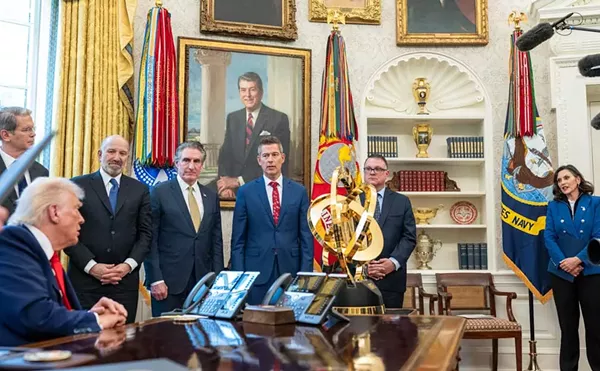They won't back down. That appears to be the stance of UAW Local 594 at GM's Validation Center in Pontiac. On two recent Tuesdays, hundreds of workers marched at the plant to protest what they say are contract violations by management.
Local 594 Vice President Larry Trandell says that the 1996 contract prohibits visitors from other plants from spending more than a month observing operations or working at the Validation Center, which builds truck prototypes. But he says that 13 autoworkers from Mexico have been working there for a year, and says he suspects that they are not union members.
"They have been unable to produce a union card," says Trandell.
The local has also expressed concern about the Mexican workers' safety.
"When people do these jobs, they have to be trained, and there is no evidence that they have been trained," he says. "They do not speak English, and we are not sure if they understand the 'danger' and 'caution' signs."
Local officials also complain that management recently deemed many union grievances as untimely and requires employees to wear safety goggles at all times including lunch breaks. This violates the 1993 contract agreement which states that goggles are to be worn only when working, says Trandell.
"We are not against safety policies, we are against management changing a policy when we have an agreement," he says.
Dan Flores, GM Truck Group spokesperson, says the company is operating under the terms of the agreement. The Mexican workers, who he admits are nonunion, have not been at the Validation Center for a year and will not replace current employees.
"No one is being displaced," he says.
Flores says that management has modified the safety goggle policy, but informed the local of this prior to implementing these changes, which the agreement mandates. The new policy requires employees to wear goggles on the shop floor at all times.
The protests, which lasted about 90 minutes, do not stop or slow down production, but are intended to pressure management to negotiate with the local, explains Trandell.
"It was to gain the attention of the bigwigs downtown," he says. And it did. Shortly after the first protest, the local was contacted by GM personnel, who Trandell says agreed to address the locals concerns.
"We have been talking with them," says Flores. "We are confident we can work through this."
But if management does not, the local may continue protesting, says Trandell.
"We want them to live up to the local agreement and abide by that and we will not have a problem."






